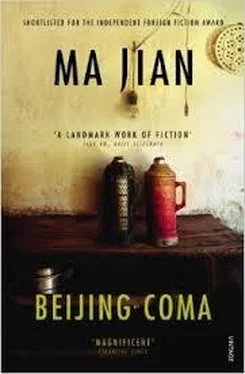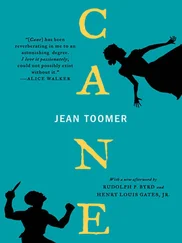‘You’re the one who keeps throwing your bloody stubs all over the place!’
Wang Fei and Cao Ming were always arguing about something. Wang Fei’s current girlfriend was a zoology student. She’d met him while carrying out a survey. She asked a hundred students how many times a week they masturbated, and fell for Wang Fei after he revealed that his average was three times a day.
‘We only smoke to mask the stench of your armpits, Wang Fei!’ Ke Xi said. ‘You smell like a fucking gorilla!’ None of us could stand Wang Fei’s body odour.
‘No, you only smoke to hide your bad breath,’ Wang Fei retorted, pointing to Ke Xi’s tobacco-stained teeth.
‘Hey, who’s got the foot odour?’ Mao Da said, walking through the door. ‘Smells like someone’s growing fungus in their socks! Mou Sen, I hope you’ve got a fat wallet. We’re about to start a game of Mahjong. We’re betting with food tokens tonight.’ Mao Da was another guy from my dorm. He always liked to place small wagers on each round of Mahjong.
The dorm was packed now. Shu Tong had to shout to get himself heard. ‘We’ve got many able activists in the Pantheon Society. We should split up into groups tomorrow and try to persuade students from every department to go to the Square. We can prepare banners with slogans calling for freedom of the press, but we’d better not start talking about an end to dictatorship.’
Mou Sen slapped his thigh and said, ‘Great! I’ll go back to Beijing Normal and rouse the workers there! I’ll be like Chairman Mao whipping up that miners’ strike in Anyuan.’
‘Everyone who thinks we should go to the Square, raise your hand,’ Liu Gang said.
Apart from the two Chans and Cao Ming, everyone put their hands in the air.
‘Fine, that’s decided then,’ Shu Tong said, standing up. ‘Liu Gang, I’ll leave you to get in touch with the Qinghua University students…’
In the silence, you search for a noise, a tiny hum that might help connect you with the outside world.
Someone is unlocking a bicycle in the yard outside. The noise isn’t coming from the footpath, but from beneath the tree to the right of our building’s entrance. I hear the key turn, but not the prop stand being kicked up.
The bike I bought myself during my first term at Beijing University was stolen after just a month. It happened the day after the Qinghua students’ demonstration. Students had covered the Triangle’s bulletin boards with handwritten posters calling for more democracy. A large crowd had gathered to read them. I squeezed my way to the front, and while I was busy copying the text of a poster into my notebook, somebody nicked my bike. It was careless of me not to have locked it. After that, I had to travel by bus whenever I went home on a Sunday, changing three or four times. And I had a long walk at the end, because the bus stop nearest our compound had been removed to make way for a new building. The old blacksmith’s shop behind the bus stop was torn down too, and replaced by a dumpling restaurant. Two large light bulbs above its doorway illuminated the trampled snow on the pavement and the metal washing-line suspended between two locust trees.
The blacksmith’s doorway used to be crammed with battered sheets of metal, funnels and empty petrol cans. The cans were dark green, and had white foreign lettering on the front and a picture of a human skull on the side. In the summer, the old blacksmith and his apprentice would take their anvil and charcoal furnace onto the pavement, and right before our eyes transform a petrol can into a metal chimney. The blacksmith would cut through the metal of the can with his large scissors as easily as if it were a sheet of newspaper. At the end of each day, the apprentice would take all the tools and scrap inside the shop, leaving an empty patch of swept pavement behind. I’d search that patch for hours, but all I ever found were a few bits of melted lead and some rusty bolt heads. My friend Duoduo cut his foot on a scrap of metal there. It served him right for walking out onto the street in his slippers.
The new dumpling restaurant made the road look brighter and warmer. The old plastic goods factory across the road was still there, but was now also illuminated. During Spring Festival, red light bulbs were hung above its doorway to form the Chinese characters for Happy New Year, and a pink glow would fall on the snow-covered cabbages on the roof of the small shack next door.
When I moved back to Beijing, we replaced our charcoal stove with a hob that runs on gas canisters. We also bought an electric water heater which I fixed to the wall of the toilet. So whenever I came home and wanted a shower, all I had to do was slip a plank of wood over the hole of the squat toilet and attach a hose to the heater. After living in the south for four years, I’d got used to having a shower every day.
Our flat has two bedrooms: one a little larger than the other. When you walk through the front door there’s a narrow passageway that serves as our sitting room. It’s just large enough to hold a small sofa and a tiny fold-up table. The iron bed I’m lying on is too big to fit in the smaller bedroom, and takes up most of the space in this room. If my mother wasn’t so sentimental about it, I would have taken it to the auction room years ago. My brother and I hated the bed because, as soon as you lie down on it, the metal springs start squeaking.
After we bought the gas hob, my mother dumped the old charcoal stove and smoke funnel on the landing outside the front door, next to an old aluminium pan, a stool with a broken leg and a pile of leftover charcoal briquettes.
When I came home, I usually chose to sleep in my brother’s single bed. We’d made a room for him by covering over the balcony outside my bedroom. There was an electric socket near the headrest, so I could plug in my radio and listen to it while lying in bed. I preferred that to watching television.
In 1986, my brother went to study computing at the Sichuan University of Science and Technology. When he lived at home, I used to hate the way he hung around me all the time, but after he left, I felt something was missing. He was almost as tall as me by then, but a little thinner. He had my mother’s wide nose, while I had a narrow, high-bridged one like my father’s.
After Dai Ru left for Sichuan, I became the only person my mother could talk to. Every time I came home, we’d end up arguing. She was approaching her fifties, and probably going through the menopause. In the past, when she gave me a haircut, she used to keep quiet and let me read the newspaper, but now she’d use the opportunity to criticise and nag me.
I remember the row we had on New Year’s Eve 1986. It was the night before our planned demonstration. In the kitchen, I muttered casually that Deng Xiaoping was trying to turn himself into a second Mao Zedong. My mother threw down the bean sprouts she was washing under the tap and said, ‘Deng Xiaoping liberated the Chinese people from the tyranny of the Gang of Four, and has put the nation back on its feet. You should be grateful to him!’
I finished washing the hairtail fish, sat down on the sofa, dried my hands, and said, ‘What do you mean, “liberated”? Who did he liberate? Did he liberate you or Dad? Tomorrow morning we’re going to Tiananmen Square to demand some democracy for the Chinese people.’
I heard a metal spoon drop and my mother shout, ‘Don’t you dare take part in any demonstration! I’ll send the police to arrest you! Have you forgotten that your father spent twenty years in reform-through-labour camps?’
This was exactly the reaction I’d expected. She still smelt of the tomatoes she’d cooked the day before. Every winter she’d buy a crate of cheap tomatoes and simmer them for hours to make a thick sauce. There was usually enough to fill five large jars.
Читать дальше












